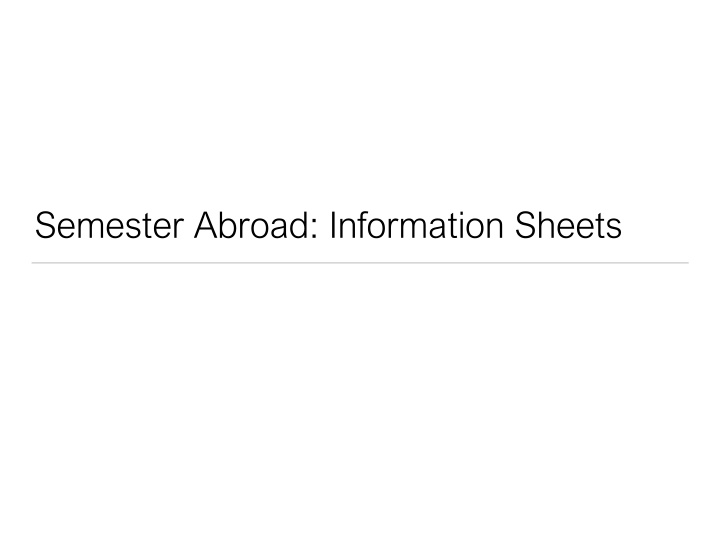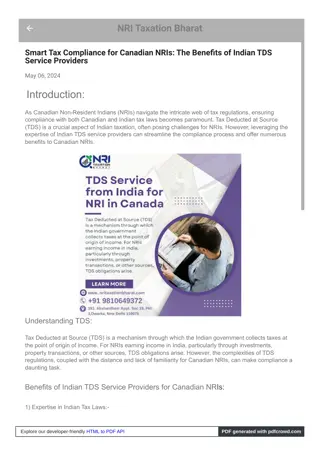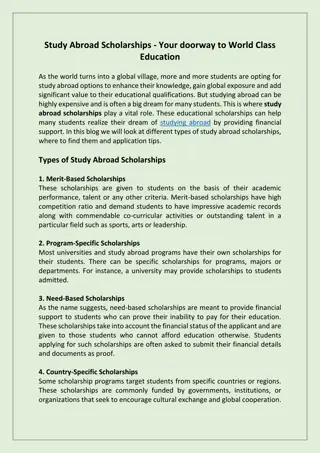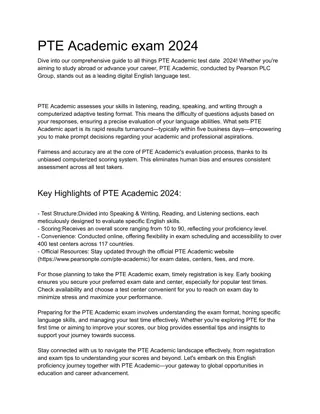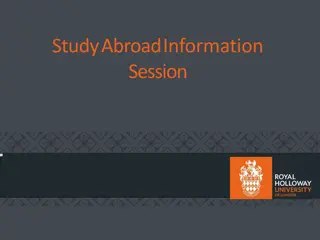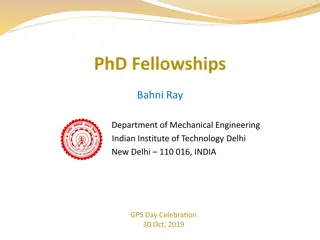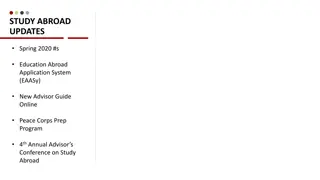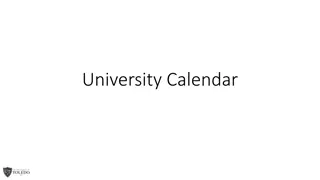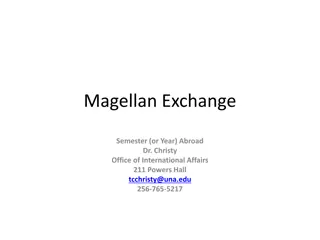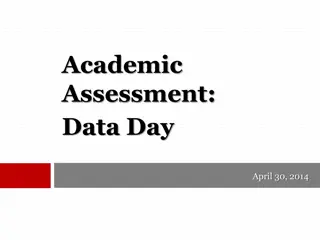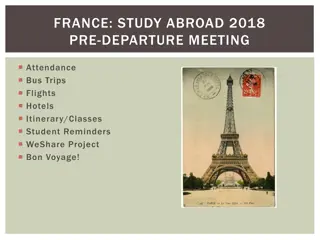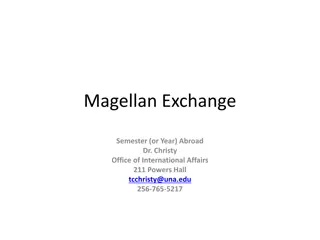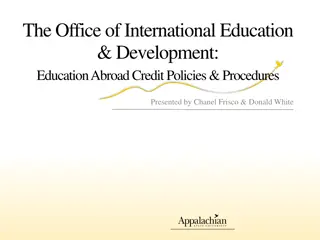Semester Abroad Financial and Academic Responsibilities
Understand the financial and academic obligations when participating in a semester abroad program. You will learn about tuition, housing, meal payments, transfer of aid, cancellation procedures, and academic expectations. Be prepared to take full responsibility for your academic coursework and financial commitments during your study abroad experience.
Download Presentation

Please find below an Image/Link to download the presentation.
The content on the website is provided AS IS for your information and personal use only. It may not be sold, licensed, or shared on other websites without obtaining consent from the author.If you encounter any issues during the download, it is possible that the publisher has removed the file from their server.
You are allowed to download the files provided on this website for personal or commercial use, subject to the condition that they are used lawfully. All files are the property of their respective owners.
The content on the website is provided AS IS for your information and personal use only. It may not be sold, licensed, or shared on other websites without obtaining consent from the author.
E N D
Presentation Transcript
Financial Matters Expectations and Responsibilities
Student Billing Report & Financial Aid AFFILIATE (3rd Party) Programs (AIFS, ISA, IES, CIEE, TEAN, etc.) EXCHANGE (Poet Preferred) PROGRAMS (Liverpool, Queen Mary ) Program Type You will be charged your regular Whittier tuition only. You usually pay room and board to your abroad institution. How you are charged You pay your program for all fees and services You are usually able to transfer state, federal and loans to your program. Whittier aid (JGW, etc.) does not travel. You get your GPS scholarship (minus any fees like health insurance) Enroll in your courses at your exchange university.12 units equivalent or more. Always complete your FAFSA and other materials before leaving or while abroad! Must be enrolled in INTD 380 at Whittier College Usual Whittier aid package does not usually change much (but no work-study) Must be enrolled in INTD 380 and continue with your normal Whittier College billing and aid practices. You get your GPS scholarship (minus any fees like health insurance.) Enroll in your courses at your exchange university. 12 units equivalent or more! Some details (not exhaustive) Please note: In either case (affiliate or exchange), students need to be enrolled in INTD 380, for 12 credits, at Whitter College during their semester abroad. This is a place holder for your study abroad units to be transferred upon receipt of your transcript. The Office of International Programs will communicate with the WC registrar to have this done for you. Do not do this yourselves!
Financial Responsibility You will pay either Whittier (exchange) or your program (Affiliate) for your tuition. Housing and Meals may be charged by your program or already be a part of your program. You will receive an invoice for these charges and you are responsible for remitting payment directly to your program unless Whittier pays and then bills you (exchanges). Airfare, housing deposits, baggage insurance, textbooks, course fees, passport fees, visa fees and personal expenses are your responsibility. If payments are not made to the WC Business Office, student s account may be subject to collection procedures.
Financial Responsibility If you decide to cancel your participation in the study abroad program, you must immediately notify the Office of International Programs in writing and complete any other necessary paperwork.
Academic Life Abroad Expectations and Responsibilities
Academic Life Abroad: Expectations WC expects students to assume total responsibility for full time (12 units equivalent) academic course work You may drop a class only in accordance with the rules governing add/drop at your host institution. Don t forget the "Concurrent Enrollment Form (CEF) Retain all add/drop paperwork until after your courses/grades are confirmed by Whittier You are required to do the work: all papers, projects, etc. and take all regularly scheduled exams in each course. Missing an exam due to travel delays is not a viable excuse and the faculty may not schedule a make up with you. Remain at your host institution until the scheduled conclusion of the program/term. Keep your syllabi, work, etc.!
Academic Life Abroad: Expectations Many differences exist when one compares higher education in the US to higher education abroad. Universities may have tougher grading standards Large lectures are common Fewer weekly quizzes; more term and final papers Faculty require students to be independent learners Students are responsible for understanding the standards of the host institution. Contact your host faculty if you are having difficulty or seek out resources offered by Centers for Academic Success, Tutoring Services, etc.
Academic Life Abroad: Registration and Credit Information You will be registered for 12 SA credits as a placeholder INTD 380. Final results will be posted by the Whittier Registrar s Office once your official transcripts have been received from your host institution Holds must be cleared before you can be registered. The OIP will not clear holds for you My.Whittier will show you in INTD 380 for Fall 2023, etc. Do not go on My.Whittier and register for anything on the Whittier Campus you will be double billed You must ensure that all your overseas courses have been reviewed and approved by WC before your departure via the Concurrent Enrollment Form (CEF). If things change abroad, fill out the online form! If you enroll in classes while abroad that were not part of your CEF, you can petition for those courses after your return.
Academic Life Abroad: Registration and Credit Information You are required to transfer a minimum of 12 (US) credits In exceptional cases a load in excess of 17 credits (US) may be taken only with the prior approval of both your advisor and the Registrar. You must complete and submit the Credit Overload Form to the Registrar s Office to enroll in more than 17 credits It is your responsibility to make sure you know the how the host university credit system converts to US credit equivalencies
Academic Life Abroad: Registration and Credit Information All courses are taken for Credit/No Credit Grades from your semester abroad program will not be factored into your GPA Graduate Schools will likely request an official copy of the program s transcripts which will reflect your actual grades Students are not allowed to withhold courses/grades from host institution transcripts If you enroll in a class with a lab/course fee, it is your responsibility to cover the additional fees
Academic Life Abroad: Registration and Credit Information Your host institution transcript must be sent to: Registrar Whittier College 13406 E. Philadelphia Street Whittier, CA USA Be sure to fill out the Transcript Request Form before you leave your host campus as your transcript cannot be forwarded without your written permission. Keep in mind that transcripts can take 2-3 months (and in some cases even longer!) to arrive at Whittier College. Retain all your course work and syllabi until your grades post on your Whittier transcript and your courses have been applied to your Degree Audit.
Academic Life Abroad: Registration and Credit Information Since you will be overseas during Registration, track your advisement and registration carefully. Plan ahead. Study Abroad students have been allowed to register one week in advance of campus students, but this policy may change.
Academic Life Abroad: Student Conduct Norms of conduct may be different from standards at home. Do NOT cause an international incident! WHITTIER CANNOT INTERVENE IN FOREIGN AFFAIRS OR LEGAL ISSUES IN OTHER COUNTRIES. WHITTIER IS NOT RESPONSIBLE FOR YOUR CONDUCT. Learn your country s normative values regarding behavior and be respectful of them. Whittier College students who participate in a Whittier sponsored Study Abroad program will be held responsible for all rules of conduct in written form in the Whittier College Student Conduct Code. If an incident is serious, you will be brought before the Conduct Board at WC upon your return. This includes but is not limited to: illegal behavior, plagiarism, alcohol abuse, etc. Studying abroad accelerates your independence and maturity. Learn to be a diplomat.
Academic Life Abroad: Confirmation & Overseas Housing Agreements/Deposits If you decide not to participate, you are responsible for reimbursing Whittier College for any funds paid on your behalf and any subsequent withdrawal penalties as outlined in the Pre-Departure Handbook and the specific program materials. If your programs requires a damage deposit for housing, it is your responsibility to remit payment directly to your program for this deposit. If you keep your accommodations clean and free of damages, it will be returned to you in full after the conclusion of your program.
Academic Life Abroad: WC Housing Requests Work with ResLife for room selection before you return. You will probably need to rely on a trustworthy friend for this!
Academic Life Abroad: Housing Requests for your return Make sure you understand Whittier College s housing policy! https://www.whittier.edu/admission/admitted/housingform
Academic Life Abroad: Visas A visa is a document that gives you permission to enter the host country as a student. Please make sure you have fulfilled all of the paperwork requirements necessary before you depart! Start this process as soon as possible! Legally, the OIP cannot provide advice about how to obtain a Visa for a foreign country. It is best to follow the instructions provided by your program and work with the Consulates and their websites.
Health, Safety and Fulfillment What Expect. Responsibilities. Rewards.
Checklist for a Healthy Semester Abroad I have enough medication for the trip or information regarding how to obtain a renewal abroad I have reviewed my medical risks and understand my decision to study abroad. My medication(s) are in my carry-on luggage, clearly identified by the label or prescription I have a separate copy of my medication information and contact information for my psychiatrist/psychotherapist/pharmacist at home I have contact information for my study abroad director at Whittier College, my on-site program administrator or Resident Director, the local US embassy or other resources abroad in case I need help getting mental health support while abroad I am carrying bottled water or I know the water where I am going is safe to drink I have packed something for comfort when I get homesick, such as photos or a journal Your program will ask about your health history not to pry into your personal life but to be able to assist you in case of an emergency. Please be as accurate as possible when filling out your Health Form.
Safety Abroad Do not let paranoia ruin your travels. However, a reasonable amount of precaution is important. Stay alert, not paranoid. Always pay attention to your surroundings and do not be foolish with your belongings. NEVER accept to carry a stranger s belongings. NEVER ask a stranger: Can you just watch my stuff for a minute? Recommended: Do not carry your passport with you on a daily basis Keep it in your room and use a photocopy as your ID. Take a few copies and leave a few photocopies of your passport with loved ones at home in case you need to ask them to fax a copy to the local embassy for re-issue.
Safety Abroad It is important to remain calm and inconspicuous; keep a low profile. Keep a clear mind at all times and avoid alcohol and drugs. Always have a trusted buddy. Avoid areas where demonstrations are in progress. It may be illegal for you to participate and you could be ordered to return to the United States Use the buddy system when venturing about. Always alert your program director AND OTHERS when traveling off program. Register with the US Embassy before departure.
What can you do to be safe? Understand that cross-cultural sensitivity does not include relaxing personal boundaries. Define your own. Drink moderately or not at all. If you drink, drink with a trusted friend who can watch out for you. Never accept drinks from strangers. Never leave your drink unattended. Trust your instincts Always be aware of what s happening around you. Socialize safely. If dating in a foreign country, always do some research about the person first. Ask around, Google them Sexually transmitted diseases are just as prevalent abroad as they are here. Take precaution ALWAYS! Never hitchhike or accept a ride from a stranger. Maintain contact with friends Let people know where you are going. Keep emergency contacts at hand.
Notes from the Student Health & Wellness Center The new TB Skin test protocol and what it means to you as students Travel physical Exams and Vaccination requirements The importance of Flu Vaccine Ebola: http://www.who.int/mediacentre/factsheets/fs103/en/ Health Information: http://www.whittier.edu/academics/oip/studentresources COVID: Follow your programs local instructions and ask about return travel requirements to U.S.
TB Skin Test Requirement Upon Return 1. Call the Student Health & WC at 562-464-4548 with your return date from your travels 2. A TB skin test is due 10-12weeks upon your return from your travel abroad program. Please note that some students will require a 1 step TB skin test and others a 2 step. This will depend on the country(ies) you have traveled to. The Student Health & WC will inform you by email and phone call whether you will need a 1 step or 2 step. This can be done at the Student Health & Wellness Center or your own medical provider. If you opt to have the test done off campus, please provide us with medical documentation of the date the TB skin(s) was given, the date the TB skin test was read and the results. If the TB skin is positive, you will need a chest X-ray as well. You will need to provide us with a copy of the X-ray results. A hold will be placed on your account if our office does not receive proof by the 10thweek upon return. If you have not completed this requirement by the 12thweek, you will be placed on Interim Suspension for failure to comply
Insurance What Expect. Responsibilities. Rewards.
Insurance Plans Whittier College requires all students to carry comprehensive medical and accident insurance during their time abroad that provides coverage to those sick or injured outside of the United States. Many programs provide students with overseas insurance make sure to check whether it does or doesn t. If your program does not, a policy will be purchased by the OIP on your behalf Unless you indicate otherwise, the Whittier College Student Insurance will be your policy by default. To complete a waiver, please contact the Business Office. Students on exchanges/direct enroll will be issued iNext insurance starting zzzz zzzz and ending zzzz after May 31, email me your start and end dates. zzzz. If you need a date
Various Other Matters What Expect. Responsibilities. Rewards.
Money Remember: There are two things that you can do with your money; you can buy things or do things. Make sure your ATM/Debit/Credit cards can work internationally (4-digit PIN) Leave a photocopy of your ATM/Debit/credit card with your parents in case of loss or theft. Do not bring personal checks from the USA they cannot be used abroad and banks will not cash them. Power of Attorney or Online Banking Working abroad is practically non-existent and may violate your student visa terms.
Cell Phones & Internet Remember the time difference when calling home! Contact your US carrier (AT&T, Sprint, etc.) to inquire if your phone will work abroad and what the cost will be to operate. It is sometimes recommended that you purchase a cell phone once you arrive in your host country. DO NOT EXPECT TO HAVE THE SAME ACCESS OR SPEED OF ACCESS WHEN YOU ARE ABROAD! Skype, FaceTime, etc. TSA Technology Separation Anxiety Consider going old school and send your friends a letter or postcard through the post!
Culture Shock Culture Shock is a logical reaction to differences we encounter in a foreign environment. It is completely NORMAL You are not a freak! There are 5 distinct phases of culture shock: 1. Being fascinated with all the new things you are experiencing 2. Feeling uncomfortable because you don t belong 3. Rejecting the foreign culture and people because they are strange 4. Learning to decipher foreign behavior and customs 5. Accepting and enjoying the foreign culture Symptoms of Culture Shock: Being homesick Increased desire for sleep Not knowing how to cope with the environment Extreme reactions to little frustrations Knowledgeable travelers advise handling culture shock with adaptability, a sense of humor and a lot of common sense!
Find Purpose, Make Meaning Nash & Murray, 2010 Meaning is not always an external goal to be pursued; it is frequently the aftermath or by-product of an activity to be enjoyed for its own sake. Be a story seeker as well as a story teller . Ask existential questions: o Even though this experience (independence) is challenging, I m looking forward to being on my own, without anyone telling me what to do. Why is that? o How, if at all, can I clean up all the messes in the world caused by wars, environmental decay, corporate greed, social injustice, political corruption and irrelevant education? o What do my host country peers think about these issues and how would they solve these problems?
Intercultural Development Continuum Stage Stage Appropriate Intercultural Skills The ability to gather appropriate information about culture The initiative to explore aspects of subjective culture Trust, friendliness, cooperation The ability to recognize difference Denial The discipline to maintain personal control The ability to manage anxiety Tolerance and Patience Polarization (Defense and Reversal) Cultural general knowledge Open-mindedness Knowledge of their own culture Listening skills The ability to perceive others accurately The ability to maintain a nonjudgmental interaction posture Minimization Cultural specific knowledge Cognitive flexibility Knowledge of other cultures Contextual knowledge Respect for others values and beliefs Tolerance of ambiguity Acceptance Empathy Risk-taking skills Problem-solving skills Interaction management skills Flexibility Adaptation
